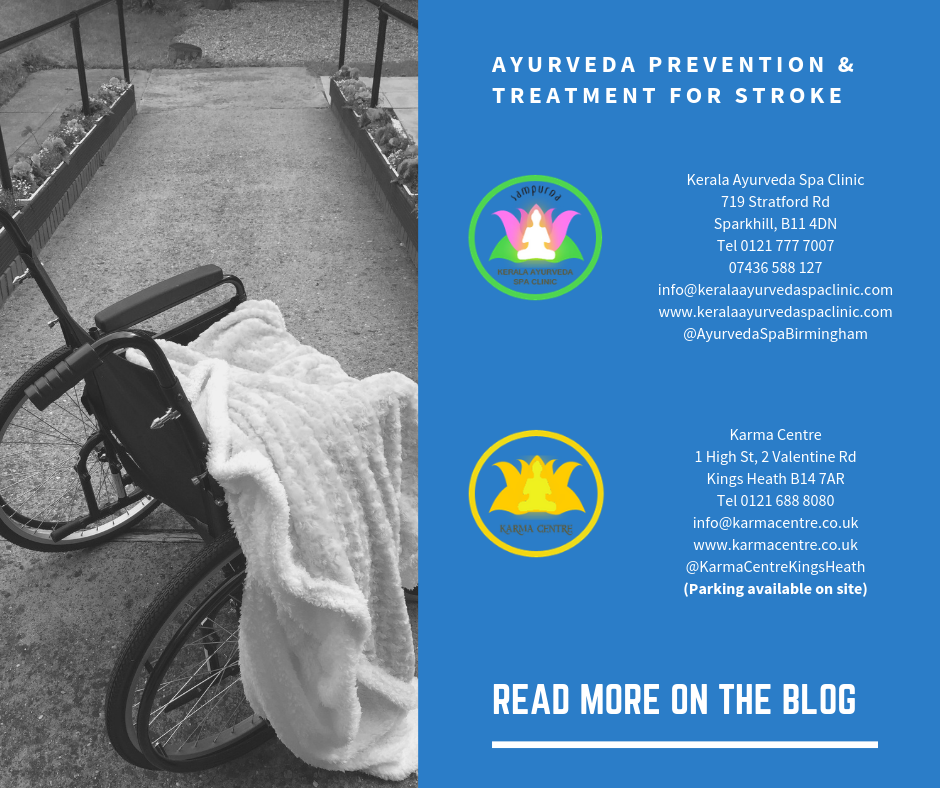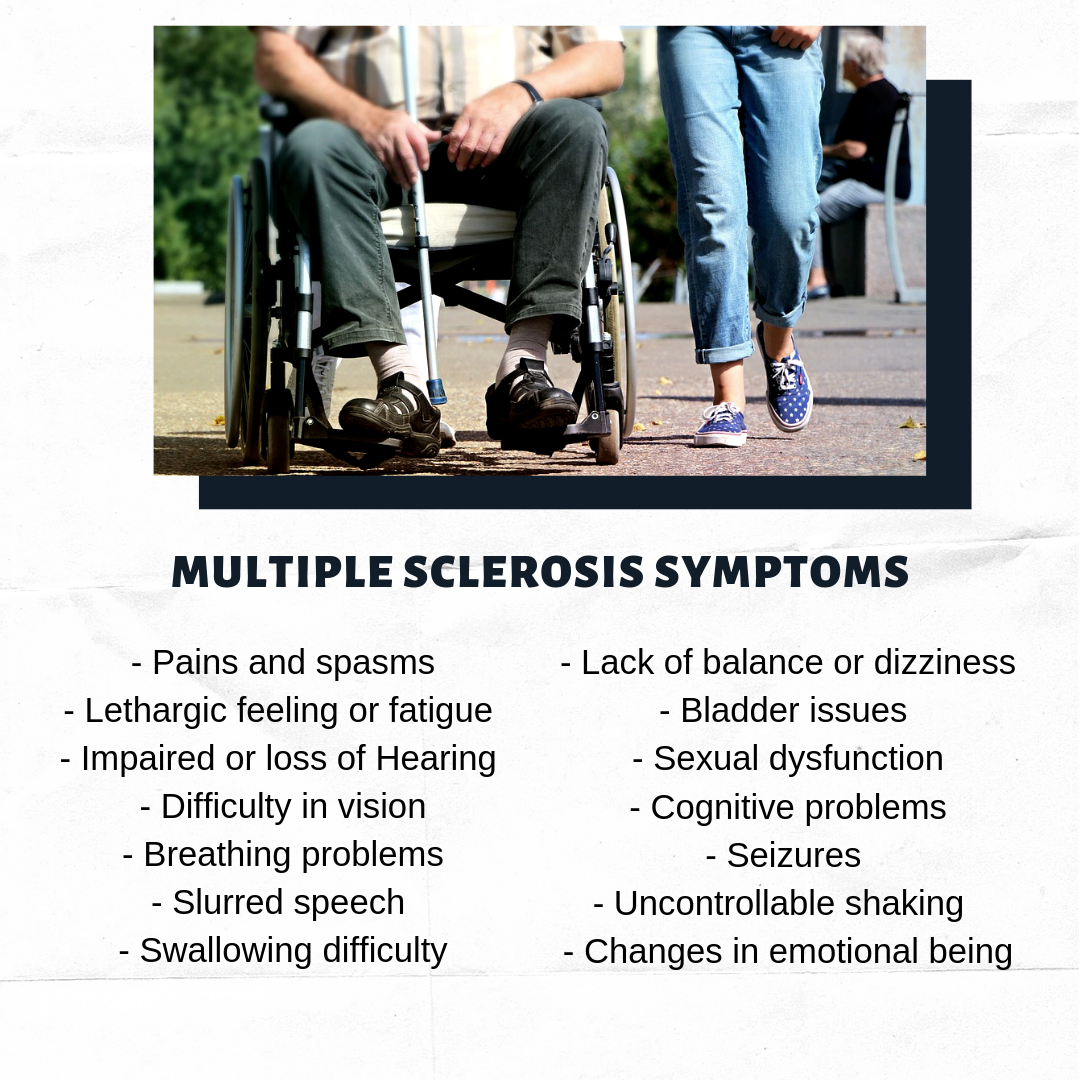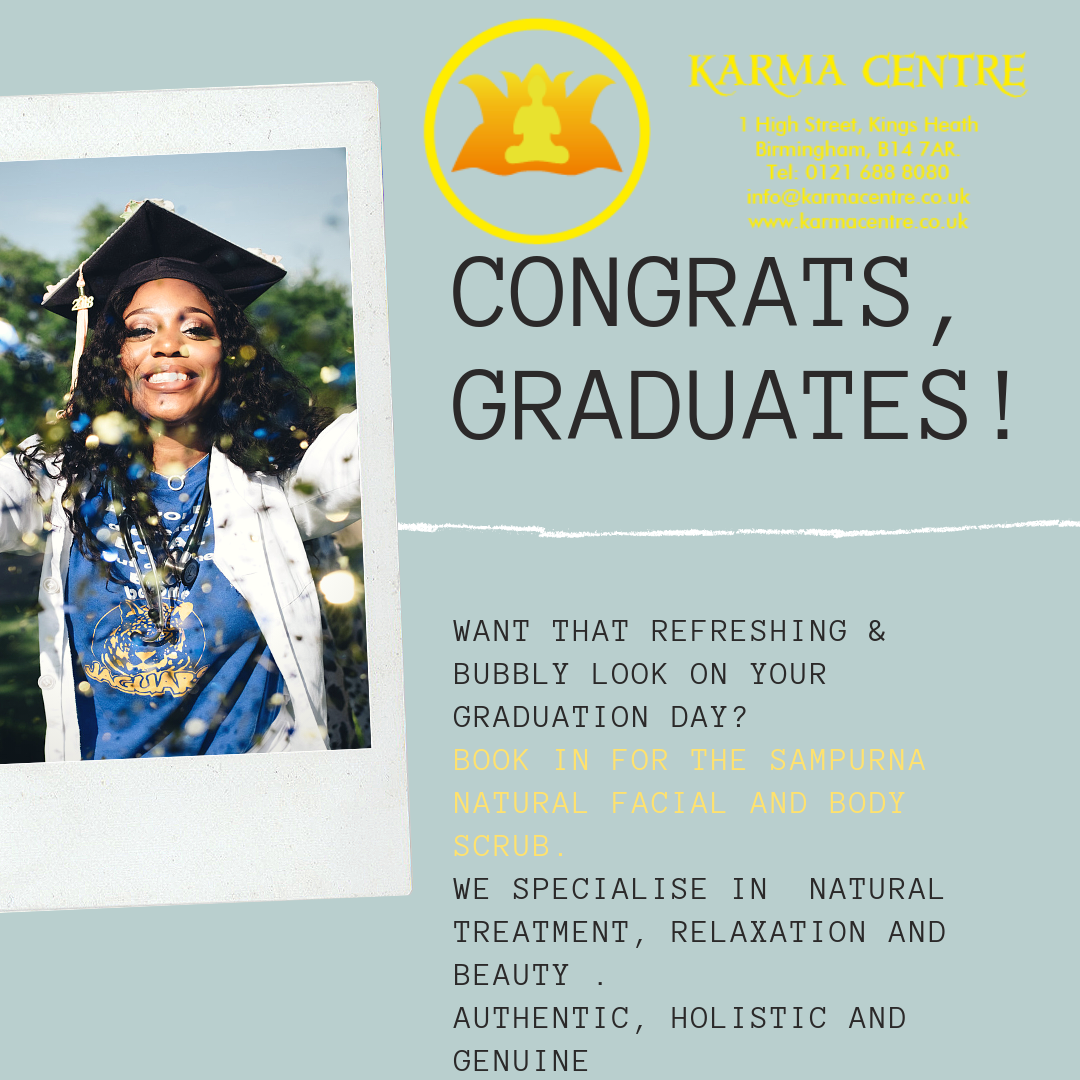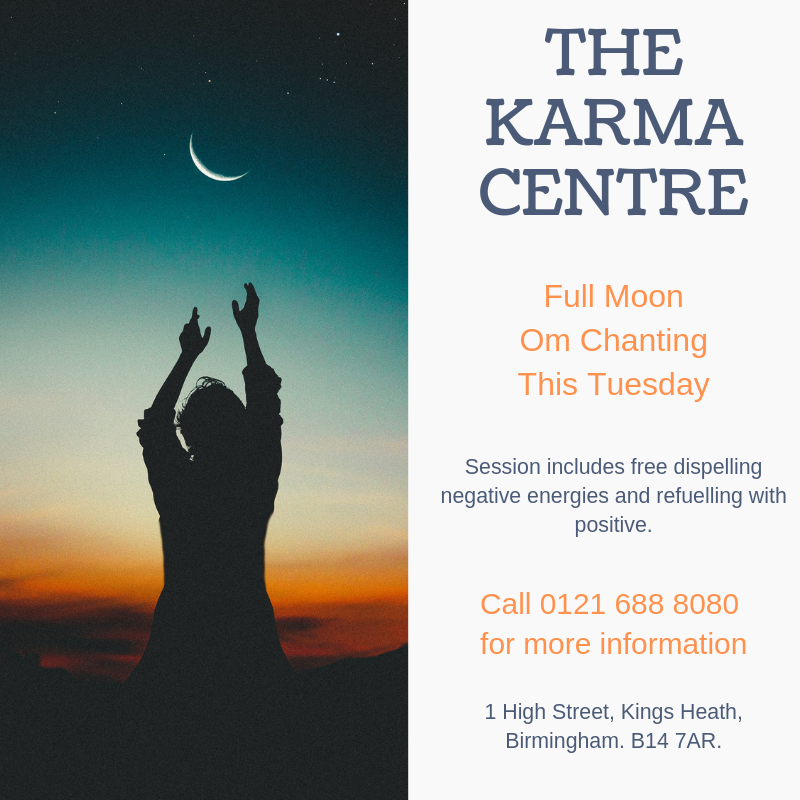
Ayurveda basics definition
Stroke is the sudden loss of function in a part of the brain. It normally results in difficulty moving an arm or leg which is referred to as paralysis. The person’s sensations may be affected.
Causes
It is thought to be due to contraction of a blood vessel to brain. Factors that contribute are high blood pressure, family history, hardening of the arteries, diabetes, obesity and smoking. The Ayurvedic texts attribute such condition to a blockage of Vata movement. The two types are: Ischaemic – where the blood supply is stopped because of a blood clot and Haemorrhagic – where a weakened blood vessel supplying the brain bursts.
Treatment plan
Treatment depends on the type of stroke you have, including which part of the brain was affected and what caused it. Treatments should be so to prevent and dissolve blood clots, reduce blood pressure and reduce cholesterol levels. A patient who suffers paralysis due to stroke for longer than a year requires more extensive treatment. This is because part of the body has been inactive for so long that the muscles start to waste away.
Consultation
Ayurvedic Consultation with a qualified and experienced Ayurvedic Doctor is necessary.
Diet
Drinking Black or Green tea, eating Fruits and vegetables for example Pomegranate. More info can be given after consultation.
Therapies
Internal and external therapies include Snehana, Swedana, Virechana. Medication can help regain strength of muscles as well as overall immunity.
Supplements
Anti-vaata drugs are used for treatment. Herbal supplements are a popular choice for people who prefer natural remedies. Herbal supplements may improve blood circulation in the brain and help prevent another stroke. Herbs such as Ashwagandha, Bilberry, Garlic, Turmeric are all good if there are no other complications.(Avoid these supplements if you’re taking warfarin (Coumadin), aspirin, or any other blood-thinning medications) Always ask your doctor first before taking any additional supplements.
Uncontrollable risk factors
Uncontrollable risk factors are: age, gender, race, a family history of stroke, a personal history of stroke.
Controllable risk factors
Common controllable risk factors for stroke include: the use of alcohol or drugs, such as cocaine, a lack of exercise or physical activity, smoking, a poor diet, an unhealthy weight, diabetes, stress, depression, unhealthy cholesterol levels, high blood pressure.
Prevention
Self Help Yoga and Tai Chi, Managing your weight, Managing stress, Massages can help increase blood flow to an affected area, Aromatherapy.
Disclaimer
This information is not intended for use in the diagnosis, treatment, cure or prevention of any disease. If you have any serious acute or chronic health concern, please consult a trained health professional who can fully assess your needs and address them effectively.

Autism is recognised as a complex neurodevelopmental disorder impacting the normal functioning of the brain, challenging the child’s development particularly in the field of language and communication, social skills and emotional behaviour.
There are three types of autism spectrum disorders:
1. Autistic Disorder. This is sometimes called “classic” autism.
2. Asperger Syndrome. People with Asperger syndrome usually have milder symptoms of autistic disorder.
3. Pervasive Developmental Disorder – Not Otherwise Specified.
Ayurveda is the oldest holistic medical system continuously practiced from over 5,000 years ago. The Sanskrit term ‘ayurveda’ is composed of two words: Ayur and veda. Ayur means life and veda means knowledge; thus, the literal meaning of Ayurveda is the “Science of Life,” and the knowledge comprising ayurveda was given to the people of ancient India more than 5,000 years ago.
Ayurveda uses natural remedies – diet, exercise and lifestyle management along with herbal medicine, manipulative therapies and counselling – to restore, promote and maintain a balanced state of health. Ayurveda addresses the whole the individual’s physical, psychological; and spiritual selves.
These are some key areas Ayurveda concentrate on:
1. Digestion – Eating involves sight, smell, taste, chewing, swallowing and digestion. Suitable nourishing diet for each individual need to be set and monitored by the Ayurvedic professional.
2. Allergies – individual need to be monitored for food allergies.
3. Toxins – causes of illness could be related to undigested, unsuitable foods can lead the accumulation of toxic material.
4. Senses -Ayurveda recognises the importance of the senses in autism – sight, hearing, smell, taste, touch. movement and balance. Sometimes when touched unexpectedly, they may feel pain, fear and confusion which can make communication difficult.
5. Focussing – Autistic individuals usually by routine have their own comfort zones, any disorders or changes is can cause upsets to the point of shut down.
6. Responsiveness – background distractions can interfere with the autistic individual to concentrate and understand
7. Behaviour – repetitive body movements such as rocking, humming etc is a way of coping with any form of upset or disorder.
REASONS FOR CONDITIONS There is no known single cause for autism spectrum disorder, but it is generally accepted that it is caused by abnormalities in brain structure or function.
A variety of nutritional, herbal, physical and manipulative therapies are employed toward removing toxins from the system and at the same time nourishing and energizing the cells and tissues so that they may repair themselves and provide grounding.
Diet
For the treatment of autism, we first need to improve the digestive power of the children. Consult with Vaidya for individualistic diet (also with Primary Healthcare Physicians) Ayurveda prefers a vegetarian diet, but any organic, whole food diet will give quick results. If the child is constipated, then a vegan or vegetarian diet is strongly recommended. The most important factor is removing all processed foods from the diet. Ghee and olive oils are recommended with a special emphasis on pure cow ghee. Organic ingredients should be used as much as possible, try gluten-free and casein-free diet, use seeds such as amaranth, quinoa, millet and buckwheat. Diluted yoghurt drink blended with spices such as cardamom, black pepper, cinnamon, cumin, coriander and ginger. A little jaggery or raw sugar may be added.
5-6 drops of coriander juice should be put into food each meal as a seasoning.
Long Pepper, Black Pepper.
Fresh fruit juices especially if organic and in season aid in detoxification of all tissues and are very calming and soothing to the mind and nerves. Diluted fresh pomegranate juice, Mango and Paw Paw, Apple and grape, Grape and carrot, Apple and carrot, Paw Paw and pineapple are recommended.
Avoid – Microwaved food. All refined processed and chemical food (this includes white sugar, chips, chocolates, white flour, legumes other than green and white mung, soft drinks and most anything you would find in a modern supermarket shelf), Dairy Products, Night Shade Vegetables, including tomatoes, eggplant, potatoes, and peppers, Citrus Fruits, Peanuts. Preservatives, colours, food additives, Leftovers, Old cheeses, Cold foods and drinks, All soya products and their derivatives. If you are lactose intolerant and can’t take organic milk, then make almond or rice milk (do not purchase readymade milk powders). To make almond milk, soak and skin some almonds and blend with water.
NB: Only use fruits that are in season and ideally organic otherwise peel them.
The body cannot easily digest chemically extracted vitamins so look for vitamins from a balanced nutrition and strong digestive fire. Check with your doctor and find natural substitutes or consult with a qualified Ayurvedic doctor.
ABHYANGA MASSAGE
This is an oil massage that is soothing, and we find that initially it can be daunting but once they get used to it, they will enjoy it and learn to relax during the therapy.
COMPLIMENTARY THERAPIES
1.1.Poorva Karma -Preparation for Pancha Karma
2. Pancha Karma –Main detox
3. Pashchatya Karma -Post Pancha Karma.
YOGA AND PRANAYAMA
Yoga as a form of exercise can be used in children with ASD by addressing their physical and sensory issues. The practice of yoga improves muscle strength, tone and helps children to become aware of their placement of arms, legs and feet in comparison to the rest of their body.
The additional physical strength also helps to improve coordination. Pranayama (breathing technique), Asana (postures), Bandhas and Mudras (relaxation and meditation) promote physiological and psychological processes which can induce a calm state of mind. Yoga soothes the nervous system, the poses of flowing movements that allow energy to be released through the movements of the yoga the overburdened sensory system is calmed and pent-up energy is released. By practicing yoga, the autistic person gets a break from his or her usual experience of a sensory overloaded body.
Practicing yoga may help a child feel relaxed and able to concentrate better on learning social skills
Yoga can help to decrease anxiety, releasing energy and calming down their burdened system. Yoga can have a positive effect on Central Nervous System like improving the wave frequencies, glucose metabolism, neurotransmitter activity and the autonomic nervous system all of which are affected in disruptive behaviour. It can prove to be a useful tool for children with Autism and requires a long term practice. Yoga postures that may help in autism include Trikonasan, Veerbhadrasan, Parvatasana, Sukhasan, Shavasana, Makrasana.
Alternate Nostril Breathing (Anuloma Viloma) is easy to use and employ at any time. This exercise affects your autonomic nervous system (the one we have no conscious control over). The mind is being used directly to regulate the breath, allowing the body to learn to self-regulate. Being centred has to do with balancing the energy on the left and right sides of the body, an important part of self-healing. Breathing Exercise can also be very helpful
SAMPURNA VAIDYARS HAVE BEEN WORKING WITH SPECIALISTS IN THIS FIELD AT PRESENT (Our contact is a Professor who has dedicated his career to developing natural cures for children with growth, memory, attention deficit issues.
Disclaimer
These are general guidelines and do not apply to people with certain disorders. Always check with your GP especially for diet suitable to your condition If you have any serious acute or chronic health concern, please consult a trained health professional who can fully assess your needs and address them effectively. If you are seeking the medical advice of a trained ayurvedic expert, please check the authenticity of their qualification.

Treatment in Ayurveda
Multiple sclerosis (MS) is an inflammatory disease it affects the ability of nerve cells in the brain and spinal cord to communicate with each other. The five elements of nature are deemed present in all humans and notably grouped in 3 key doshas in Ayurveda – Vata, Pitta and Kapha
Vata is composed of Space and Air,
Pitta of Fire and Water, and
Kapha of Earth and Water moving.
Multiple Sclerosis is a pathology that involves two doshas – Pitta and Kapha.
Pitta as the manager of heat in the body attacks the nerve sheaths (Majjadhatu) that are controlled by Kapha. This disease is usually classified as Kapha Roga because the dhatu(tissue) under kapha control is being damaged and ceases to function correctly.
Herbal therapies
Herbal treatments should be given by a qualified person. It is most important in to eliminate stools regularly. Daily elimination is extremely important in the treatment of MS, Shodhana Therapies assist in clearing the system.
Ayurveda also aims to boost the immune system of the body in order to cease the process of demyelination and counteract the degenerative condition.
Therapeutic Yoga practised by a master can assist at early stages, however breathing exercises are an invaluable addition daily routine.
On Diet
Refrain from:
– Coffee
– Colas or soft drinks (sweat carbonated beverages)
– Cigarettes (abrupt stopping can cause a relapse)
– Alcohol
– Eating between meals
– Sweets and chocolate (If you eat sweets eat them after the mid-day meal when they will do the less damage)
– Fermented foods,
– Acidic foods and
– Peanuts
Consume In moderation
– Black or green tea can be taken up to 200 ml per day, not more.
– Small amounts of red wine can be taken – not more than 200 ml per week.
Add to your intake
– Ginger tea plus digestive spices to increase Agni (digestive capacity)
– Spelt (grain)
– Whole Grains (wheat, etc.)
– Almonds
– Spirulina
– Chlorella
– Ghee
Develop a routine for eating, sleeping and working.
1. Wake Up Early in the Morning.
2. Clean the Face, Mouth, Teeth and Eyes.
3. Drink a glass of room temperature water.
4. Emptying your bowels and bladder.
5. Rub warm sesame oil over the head and body. A couple of drops of sesame oil in each nostril.
6. Regular exercise, especially yoga, improves circulation, strength, and endurance.
7. Do 10 minutes of breathing exercise – alternate nostril breathing is best, but watching the breath pass the entrance of the nostrils is good enough.
8. Bathing is cleansing and refreshing.
9. Dressing – Wearing clean clothes uplifts and brings beauty and virtue.
10. Have a hot drink (ginger tea, etc.)
11. Eat breakfast – warm food in small amounts if you are not hungry. Warm food in larger amounts if you are hungry.
12. Go to work or other daily activity.
13. Mid-day – stop and eat lunch. Eat warm food if possible. Avoid cold raw foods as the only lunch. Salads can be eaten after a warm meal. Take at least 30 to 60 minutes break at mid-day. This should be a main meal in your day.
14. Return to work or other daily activity.
15. Have a hot drink in the late afternoon – 4pm
16. Avoid sweets or candy bars.
17. Return home after work.
18. Eat the evening meal earlier rather than later. You need to have 3 hours of time to digest your dinner before going to sleep. Avoid dairy products at night. NO yogurt or creamy foods. Eat lighter than at mid-day. NO desert or snacks after eating.
19. sit 10 minutes and do the breathing exercise that you did in the morning.
20. Before sleep apply a little sesame oil to the bottom of your feet.
21. Cover them with socks and go to bed.
22. You should be in bed by 11pm.
Diet should be nourishing but simple. Eat enough that you are not hungry at 11pm but not too much that you feel heavy, a strict diet of no animal products and no stimulants.
Yoga has phenomenal capacity to empower ourselves, engage our bodies and remember our connection to the world. Yoga offers us to clarify the mind through Prana, detoxify the body through movement and thus channel our energy to fulfil our spiritual aspirations. Give yourself a Gift and begin your journey to a better life with Inner Peace, Love, Good Health, Fitness and Happiness.









